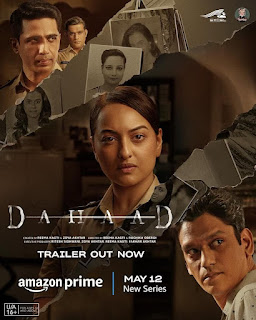The point of this extended prelude is, if Kagti and Akhtar do not necessarily have first-hand knowledge of the culture and milieu captured in their crime series Dahaad, they can be relied on to do their research to provide a sufficiently nuanced portrayal, at least for the purposes of mainstream entertainment. The setting here is mofussil Rajasthan, primarily the town of Mandawa. Progress, both technological and social, is lagging behind metropolitan India: Smartphones are rare, as are dedicated career women. Sub-inspector Anjali Bhaati (Sonakshi Sinha) faces the double-whammy of being both a woman and a lower-caste. When her team goes investigating, Anjali is barred from entering the homes of the dominant caste. A running gag shows an upper-caste colleague in the police station lighting incense to ward off her aura. Her melodramatic mother is constantly at her to get married. Like with Sinha's previous character Akira, Anjali's reaction to these challenges is to double down and fight even harder, because to give an inch would be to give up the fight altogether.
In several ways this series' antagonist is her antithesis. Anand Swarnakar (Vijay Varma, who I first saw in Gully Boy) is the eldest son in a traditional well-to-do goldsmith family. He is an articulate soft-spoken language teacher, much admired by his pupils and colleagues. While dismissed by his businessman father as a non-achieving black sheep, he has a shining reputation for his efforts at educating children in remote areas during his weekend leisure. Even his wife, who is carrying on an affair with a workplace colleague, believes Anand to be a noble man. But Anand is also a serial killer that preys on lower-caste women, first seducing and then murdering them (no spoilers here, the series is not a whodunit, but about how he is ultimately caught).
Anjali and Anand's paths cross when she comes upon a string of disappearances of under-privileged women who apparently eloped with an unknown lover; she charts a connection between them, concluding that a single man is behind all of it. Of course, the idea of a serial killer in Mandawa is laughable to most of her colleagues. Her only support comes from Station House Officer Devi Singh (Gulshan Devaiah), whose interest in her may be more than professional. Going back and forth in time, the series follows Anand's crimes and the efforts of Anjali and her colleagues to unmask an intelligent and remorseless killer.
There are many things to like about Dahaad, but some missteps as well. Sonakshi's Anjali is a spunky protagonist, determined to breach the limits placed by society. Even if it occasionally seems too eager to signal Anjali's liberated spirit (she has a casual sex relationship with a drinking buddy we never see outside of that context) Kagti-Akhtar's characterization is strong in terms of expressing Anjali's determination to be a tough girl in a tough world. Devaiah's Devi Singh is less well-etched - It's nice to see the actor playing a "good guy", but Devi comes across so "correct" in all his opinions and actions, he is bland as oatmeal. His character has a 'manufactured' feel, as though Kagti-Akhtar wanted to imbue all their expectations for an ideal male into him. I was ready to throw up when Devi Singh gives his son the sort of enlightened talk about women and sex most metropolitan men wouldn't. Even when introducing the idea of Devi being attracted to Anjali (which may be further developed in the almost certain second season), they appear obliged to soften it by giving him a shrewish nag wife.
Sohum Shah's Parghi is a competing colleague to Anjali who is trying to obtain a transfer by currying favor with his superiors. He shows some interesting character development, especially in his reluctance to bring a child into an increasingly fucked up world (I empathize), but his transformation towards the end of the season could have been better articulated. Vijay Varma's killer is a lot more believable - his modus operandi is based on a real-life character dubbed as Cyanide Mohan. Unlike the glamorous psychopaths from the Hannibal Lecter universe, Anand doesn't believe in playing amusing mind-games with the police or arranging his victims in artistic tableaux. He is a blunt petty-minded villain, whose cloak of civility only shrouds an unmitigated ugliness. Even when alluding to a childhood trauma, the writing and Varma's performance do not try to generate sympathy for the character; they only show how he uses it to further manipulate people around him.
A few logical missteps notwithstanding* my only disappointment was that the caste hierarchy element has little play in the investigation of the actual killer - It would have been interesting if Anjali's sometimes reckless pursuit of Anand had been labeled as caste revenge and affected her agency. Still, Dahaad was a nicely paced procedural with a well-realized setting, and I would recommend it to fans of dark crime thrillers.
*One thing that bothered me was, in a narrative so conscious of caste identity, why did the suspect's name Swarnakar (literally meaning 'Goldsmith') not ring immediate warning bells for the cops, especially since it is revealed to them beforehand that cyanide is used by the gold industry. Instead, they continue to fret over where he could obtain the poison. It also occurred to me a lot earlier than to these intrepid investigators that the killer, after having sex with his victims, was persuading them to consume the cyanide by disguising it as a contraceptive or morning-after pill.







No comments:
Post a Comment
Please do not post spam.